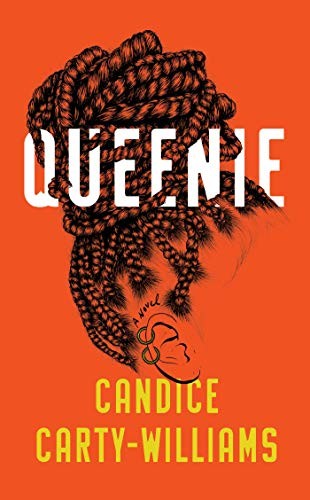Candice Carty-Williams’s debut novel, Queenie, published in 2019, is a powerful and often painful exploration of a young Black British woman navigating love, loss, and mental health in modern London. It’s a book that grabs you from the first page and refuses to let go, propelled by a raw honesty and an unflinching portrayal of its titular character. Carty-Williams, a British-Jamaican author, brings a much-needed perspective to contemporary fiction, weaving her own experiences and observations into a narrative that feels both deeply personal and incredibly universal. The book’s publication resonated strongly, landing at a time when conversations about race, identity, and mental health were becoming increasingly vital, solidifying its place as a critical voice of its generation.
The story follows Queenie Jenkins, a 25-year-old British-Jamaican woman working at a London newspaper. She’s recently gone through a devastating breakup with her long-term boyfriend, Tom, and her life spirals into a chaotic mess of questionable decisions, emotionally unavailable men, and a desperate search for connection. The narrative isn’t a straightforward romance; instead, it plunges into the complexities of Queenie’s inner world, marked by grief, anxiety, and a history of trauma. There are moments of sharp wit and genuine humor that punctuate the darker periods, offering a realistic view of navigating difficult circumstances. The pace mirrors Queenie’s fluctuating emotional state, with periods of frenetic activity followed by quiet, introspective moments. The setting of London, with its vibrant multicultural backdrop and the undercurrent of societal pressures, serves as both a character and a mirror to Queenie’s inner turmoil. You can almost feel the claustrophobia of her tiny apartment and the buzz of the city streets. This is not a book that shies away from uncomfortable truths, choosing instead to confront the realities of mental health with brutal honesty.
Queenie herself is a character that is both frustrating and deeply endearing. She’s flawed, impulsive, and often makes choices that are clearly self-destructive. Yet, it’s impossible not to sympathize with her struggles. Her relationships, particularly with her family and her group of friends, provide a glimpse into the cultural nuances of her upbringing and the unique challenges she faces as a Black woman in London. We witness the push and pull of these connections, the moments of love and support alongside the misunderstandings and unspoken tensions. Her character development is not linear, but rather a messy, back-and-forth process that feels profoundly authentic. The book doesn’t offer easy answers; instead, it invites us to witness Queenie’s journey, celebrating her small victories and acknowledging her setbacks with equal weight. She’s not a perfect protagonist, but she is a remarkably human one. Check it out on Amazon!
Central themes in Queenie revolve around the complexities of race, identity, and the unique challenges of navigating mental health within the Black community. The book directly addresses the stigma associated with therapy and the cultural barriers that can prevent individuals from seeking help. It explores how the pressure to be strong and resilient, often placed on Black women, can exacerbate emotional struggles. It’s not a book that offers easy solutions but prompts readers to think critically about the systems and biases that impact mental health. The emotional resonance is palpable, particularly for anyone who has struggled with feeling lost or alone. For me, the book’s honesty about the messy realities of mental health was particularly impactful. I found myself reflecting on times when I, or those close to me, had struggled to articulate complex emotions. The book’s willingness to portray vulnerability, without shying away from discomfort, felt truly refreshing.
Carty-Williams’ writing style is distinctive and engaging, marked by a conversational tone that feels intimate and personal. The prose is sharp, witty, and unafraid to tackle uncomfortable truths. The pacing, as mentioned before, perfectly reflects Queenie’s emotional state, with rapid-fire dialogues and internal monologues intermixed with moments of quiet reflection. The author’s use of flashbacks to reveal Queenie’s past traumas is both effective and heartbreaking. The narrative techniques employed – the use of interiority, fragmented memories, and shifts in perspective – pull the reader deeply into Queenie’s experience. The dialogue is realistic and sharp, capturing the nuances of everyday conversations among friends and family. It feels like eavesdropping on real people, making the characters all the more relatable. Purchase your copy on Amazon!
Queenie is not an easy read, but it is an essential one. It’s a book that challenges, provokes, and ultimately leaves a lasting impression. It matters because it gives voice to experiences that are often marginalized, inviting empathy and understanding. The book’s exploration of mental health, particularly within the Black community, is both necessary and timely. It highlights the importance of seeking help, breaking down stigmas, and creating spaces for open and honest conversations. The impact of this book is not limited to just those who share Queenie’s experiences. It offers a window into a different perspective, fostering empathy and a greater understanding of the challenges faced by young Black women in contemporary society. It encourages readers to examine their own biases and to confront difficult realities with compassion. Grab your copy from Amazon today!
I would highly recommend Queenie to anyone who is interested in complex character studies, explorations of mental health, and stories that challenge societal norms. It’s a must-read for fans of contemporary fiction, especially those who appreciate authentic and raw narratives. This book would particularly resonate with readers who enjoy authors such as Bernardine Evaristo, Yaa Gyasi, and Brit Bennett, who also explore themes of race, identity, and family dynamics with nuance and depth. Those who appreciate books with strong female protagonists and unflinching honesty about difficult subjects will find themselves completely engrossed. It is a book that stays with you long after you turn the final page, prompting reflection and inspiring conversations. Click here to buy on Amazon!

